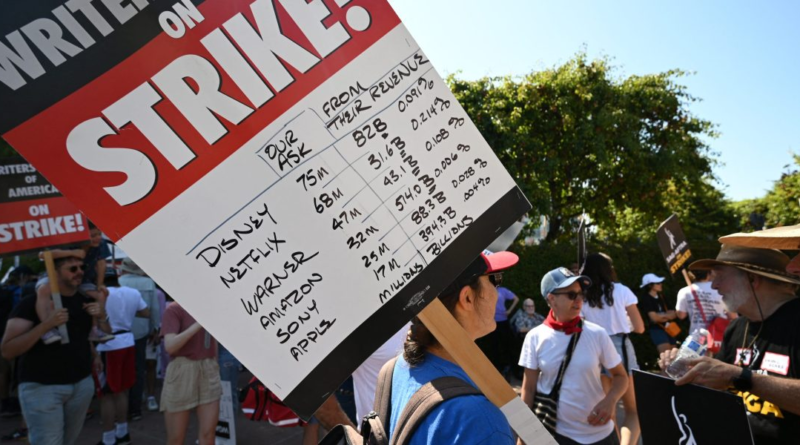Hollywood studios tout proposed 5% pay bump for writers as the biggest in 35 years, the day after UPS Teamsters ratified a 35% raise and pilots got 21%
After months of anticipation, contract negotiations between Hollywood writers and the movie studios ended abruptly amid frustration and finger-pointing.
Twenty minutes after talks collapsed on Tuesday, the Alliance of Motion Picture and Television Producers, the trade organization that represents the studios, issued a press release that detailed its offer—its first since the screenwriters’ strike began in May, which, along with another strike by actors, has paralyzed the industry. The first bullet point from the trade group offered a seemingly tantalizing concession to striking writers: the largest wage increase in 35 years.
In reality, it amounted to a 5% raise in the first year.
The small salary bump proposed to the movie and TV writers is in stark contrast to the far bigger gains made just this week by American Airlines pilots and the UPS Teamsters—the nation’s largest private-sector union. American Airlines pilots approved a new labor agreement Tuesday that would give its members 21% raises immediately, with a 46% increase over the four-year contract. And the UPS Teamsters union got a 35% increase in its minimum member pay.
By comparison, writers union members would get just one-seventh of what UPS union members and one fourth of what the pilots union received in the first year of their contracts.
The three-year deal offered by the AMPTP would give the WGA, the union representing screenwriters, additional pay increases of 4% and 3.5% in the second and third years of the contract.
The WGA and AMPTP did not respond to requests for comment.
Negotiations between the writers and the studios have been acrimonious. Even the studios merely making their counteroffer public was criticized. The writers union said the move was meant to divide members, by trying to get them to squabble over which parts of the counterproposal should be kept or negotiated further. “It is their only strategy—to bet that we will turn on each other,” the WGA wrote in a statement.
The studios’ proposal was released after a Tuesday meeting of studio executives including Disney CEO Bob Iger, Netflix co-CEO Ted Sarandos, Warner Bros. Discovery CEO David Zaslav, and Universal Filmed Entertainment Group chair Donna Langley. The WGA called into question whether the executives even intended to reach an agreement. “This wasn’t a meeting to make a deal,” the writers union statement said. “This was a meeting to get us to cave, which is why, not 20 minutes after we left the meeting, the AMPTP released its summary of their proposals.”
What else are the WGA and the AMPTP still negotiating over?
Similar to those of UPS drivers and American Airlines pilots, WGA members’ demands go beyond just pay increases; the union originally asked for first-year pay raises of 6% and 5% in the following two years—as well as changes to on-the-job working conditions.
The AMPTP counterproposal also included some protections against A.I.-written scripts—a major point of contention—to ensure that they not be considered literary material. The proposal would mean writers wouldn’t lose any compensation if A.I. were used to create a script that they also contributed to. In the past the WGA has been open to using A.I. so long as it didn’t come at the expense of writers’ credits and take-home pay.
The studio’s counteroffer made some concessions to another of the technological upheavals created by Silicon Valley: residuals for streaming. For the first time, studios and streamers appear open to the idea of reporting data regarding streaming viewership. Under the current proposal, the WGA would get access to “quarterly confidential reports” that would include the hours viewed per streamed program. The statement includes language promising to restructure current standards for residual payments—or rather nonpayments—for content that goes on streaming platforms.
In the past streaming data has been kept confidential by streaming services and studios. This reluctance to share viewership numbers means that writers and actors for hit shows don’t earn extra residual payments for streamed content as they might for television or for theatrical releases. That can sometimes cost writers and actors big money. In 2021, actress Scarlett Johansson sued Disney for breach of contract when it premiered a feature film she starred in both in theaters and on its recently launched Disney+ streaming service. Johansson alleged that the decision was made partly to avoid paying her bigger box-office-related bonuses. The suit was later settled out of court for a reported $40 million.
Another major sticking point in the negotiations is the number of writers that showrunners will be allowed to hire. The WGA’s original proposal required a minimum of five writers, while the AMPTP’s recent counteroffer was two writers, with the option to add more for longer shows. The proposal also addresses WGA demands that some writers be kept on staff through the entire production so they can gain production experience, beyond the writers’ room.
If the UPS and American Airlines labor agreements are any indication, a strained relationship during negotiations doesn’t preclude unions from securing the wages and benefits they’re seeking. Negotiations between UPS and its union employees were considered dead just days before workers were to go on strike, and American Airlines pilots rejected multiple deals going back to November of last year. It got so bad that just days after rival United Airlines finalized a deal with its pilots union, Ed Sicher, president of the union representing American Airlines pilots, issued a press release titled, “Will They Attempt to Lowball Us Again?” But a few weeks later, he was celebrating a deal that offered “substantial monetary gains and quality-of-life improvements.”

